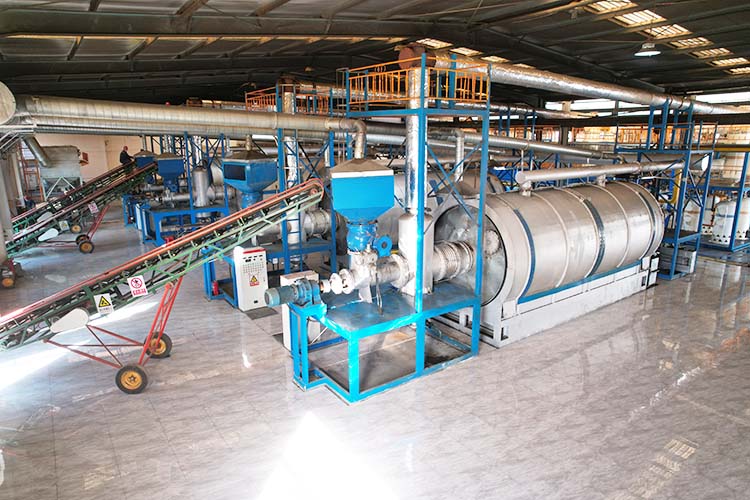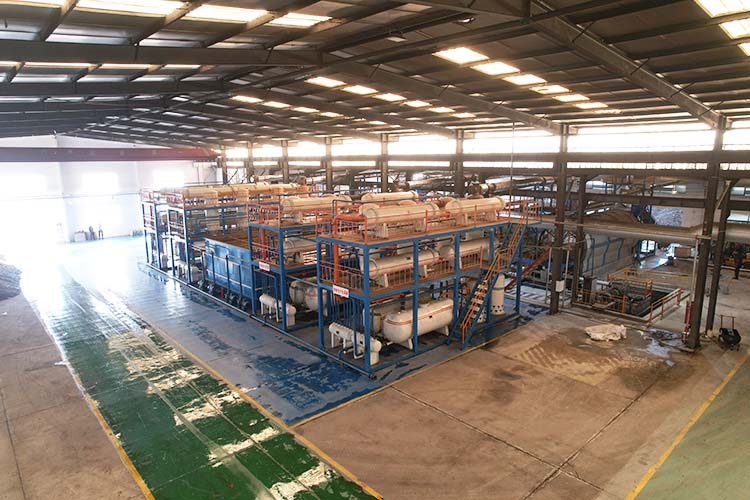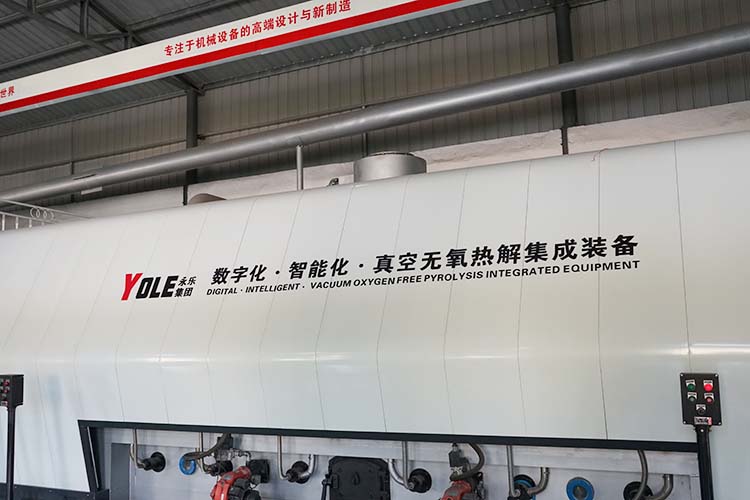Congo is an important country in central Africa. In recent years, with the promotion of mineral development, infrastructure construction and the rapid development of transportation industry, the inventory of automobiles, trucks and engineering vehicles has increased significantly, and the production of waste and scrap tyres has increased year by year. It is estimated that more than one million waste and scrap tyres are produced every year in Congo. However, due to the environmental protection industry is still in the initial stage and the waste and scrap tyre recycling and treatment system is extremely incomplete, a large number of waste tyres are arbitrarily stacked around the mine area, along the highway, at the edge of the city and at the bank of the river. These stacked tires not only occupy valuable land resources, but also easily block watercourses in rainy seasons, and increase the risk of flood disasters; In high temperature weather in dry season, the tire stack is very easy to ignite. In 2024, a fire broke out at a tire stack site in the suburbs of Kinshasa, and the burning lasted for several days. The poisonous smoke generated not only polluted the air, but also caused respiratory diseases to surrounding residents, posing a serious threat to the ecological environment and residents' health. Traditional tire treatment methods such as landfill will occupy limited available land, and tires are difficult to degrade, which will pollute soil and groundwater for a long time; Simple incineration will release a large amount of sulfide, nitrogen oxide and other harmful gases, which is contrary to Congo's concept of increasingly attaching importance to ecological protection and promoting sustainable development. How to dispose waste and scrap tyres efficiently and environmentally has become an environmental and development problem to be solved in Congo.

Waste and scrap tyre refining equipment provides a highly adaptable solution to the actual situation in Congo. Considering the unstable power supply in some areas of Congo, especially in remote mining areas and rural areas, the equipment adopts low energy consumption design, which can flexibly adapt to diesel power generation, small hydropower generation and other power supply modes, so as to ensure stable operation under complex power conditions without relying on stable power grid support. In terms of transportation and installation, the equipment adopts the modular split design, and the core components can be transported conveniently by road, inland river shipping, etc. Even in the areas with poor road conditions in Congo, they can be delivered smoothly; The installation process requires no large-scale civil works, only simple site leveling and ground hardening, greatly reducing the preliminary construction cost and construction difficulty, and adapting to the current situation of infrastructure construction in Congo. In terms of environmental protection performance, the equipment is equipped with an efficient tail gas purification system, which can effectively filter the harmful gas generated in the production process through desulfurization, dust removal, activated carbon adsorption and other processes, so that the tail gas emission fully meets the relevant standards of the environmental protection department of Congo, and avoid air pollution; At the same time, the equipment adopts the full-closed cycle production process, and there is no waste water produced in the whole treatment process, which fundamentally eradicates the pollution to the precious water resources and soil environment of Congo, and meets the local demand for ecological protection.

From the perspective of economic value, the waste and scrap tyre refining equipment can bring practical development assistance to Congo. Congo has abundant waste and scrap tyre resources and extremely low recovery cost. After equipment treatment, the calorific value of the produced fuel can reach more than 40MJ/kg, which can be directly used in the mechanical equipment, industrial boilers, generators and other fields in the mining area, effectively easing the tense situation of energy supply in some areas of Congo, reducing the dependence on imported fuel oil and reducing the cost of industrial production and livelihood electricity. The carbon black produced is of high purity and can be used in local small rubber product workshops to produce practical products such as agricultural water pipes and seals, so as to increase the added value of local industry; The steel wire recycled in the refining process can be sold to the local steel processing enterprises as the smelting raw materials to create additional economic benefits. In addition, the equipment operation process is relatively simple. The local personnel in Congo can skillfully master the operation skills after 1-2 weeks of professional training, which can not only create a lot of jobs for the local area, covering waste and scrap tyre recycling, equipment operation, product sales and other links, but also drive the development of relevant industrial chains, help residents obtain stable income through participating in waste and scrap tyre treatment industry, and help local economic revitalization.

With years of technical accumulation in the field of environmental protection equipment and international project experience, China Yongle Environmental Engineering Co., Ltd. can provide comprehensive and customized services and support for Congo. Based on the production scale and distribution characteristics of waste and scrap tyres in different regions of Congo (such as mining areas, cities and villages), the Company can flexibly adjust the equipment configuration and launch various types of equipment with daily processing capacity ranging from 20 tons to 80 tons to meet the diversified demands from small community processing stations to large industrial processing centers. Considering the relative shortage of technical personnel in Congo, the Company provides the one-stop service of "equipment installation+operation training+long-term maintenance": send professional technical teams to Congo to complete the installation and commissioning of equipment and ensure that the equipment is put into operation quickly; Carry out system training for local operators and maintenance personnel, including equipment operation, daily maintenance, troubleshooting, etc., to help them master independent operation and maintenance capabilities; At the same time, the company has set up an after-sales service station in Kinshasa to reserve common parts and components, ensure quick response in case of equipment problems, provide timely maintenance and technical support, and ensure long-term stable operation of equipment. The selection of Yongle environmental waste and scrap tyre refining equipment can not only help Congo solve the environmental problem of waste and scrap tyre accumulation, but also realize the recycling of resources, create economic value for the local area and help Congo to promote the sustainable development of green economy while protecting the ecological environment.:.
Yongle Environmental Protection is mainly engaged in the research and development, production and sales of complete sets of technical equipment for organic solid waste disposal and comprehensive utilization. Production and manufacturing, domestic waste treatment equipment, tire pyrolysis equipment, medical waste disposal equipment, hazardous waste disposal equipment, and achieve efficient and comprehensive utilization of resources through independently developed low-temperature anaerobic pyrolysis equipment technology solutions.
Tags:Waste and scrap tyre refining equipment adapts to Congo demand,waste tire refining equipment,YONGLE GROUP
 Latest news
Latest news


























